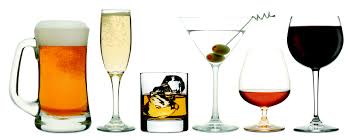Bariatric Realities – Medical Professionals’ Guidelines about Alcohol Use & WLS

Bariatric Realities – Medical Professionals’ Guidelines about Alcohol Use & WLS
I know I said my next article was going to be on causes of obesity, but I got carried away tonight doing some investigating about the professional medical guidelines for alcohol use after weight loss surgery. In summary, the gist of the recommendations are: “Patients undergoing bariatric surgery should be screened and educated regarding alcohol intake both before and after surgery… patients should be made aware that alcohol use disorders (AUD) can occur in the long term after bariatric surgery.” (From: http://asmbs.org/resources/alcohol-use-before-and-after-bariatric-surgery.)
Well, now. Those are some non-specific medical recommendations by medical professionals who are the predominant leaders and caregivers of the surgical weight loss population. Education and awareness. Hey – I am all about education and awareness. Great things, education and awareness.
And yet, I’m gonna say that as a recommendation, that is a very “PC” non-recommendation recommendation, when one considers that we are talking about 1) ALCOHOL and 2) WEIGHT LOSS SURGERY patients.
Consider these educational nuggets and facts I found that WLS patients really ought to be aware of:
Psychologist Stanton Peele, writes, “readers now know that scientifically, it's not alcohol that causes people to live longer, but it is simply being with others and that they are less socially isolated when they drink that prolongs their lives. After all, alcohol is a toxin.” (italics and bold added) (From https://www.psychologytoday.com/blog/addiction-in-society/201011/science-is-what-society-says-it-is-alcohols-poison.
My comments: Yes – alcohol is a toxin, and that means POISON. Those of us in the medical field really ought to know that people are not supposed to ingest poison. But the recommendations do not say, “Do NOT ingest the toxin, alcohol.” No, no, no… they say be educated and aware.
Dr. Charles S. Lieber, M.D., M.A.C.P., in a publication for the National Institute on Alcohol Abuse and Alcoholism, writes, ““A complex interplay exists between a person’s alcohol consumption and nutritional status,” and … alcohol and its metabolism prevent the body from properly absorbing, digesting, and using essential nutrients” (italics added.) Dr. Lieber does indeed, educate us about the nutritional value of alcohol: “Alcohol would not fall under the category of an essential nutrient because not having it in your diet does not lead to any sort of deficiency. Alcoholic beverages primarily consist of water, pure alcohol (chemically known as ethanol), and variable amounts of sugars (i.e., carbohydrates); their content of other nutrients (e.g., proteins, vitamins, or minerals) is usually negligible. Because they provide almost no nutrients, alcoholic beverages are considered ‘empty calories.’ Therefore, any calories provided by alcoholic beverages are derived from the carbohydrates and alcohol they contain.” (italics added)
My comments: People who have weight loss surgery (other than the band) experience absorption issues to one degree or another. Nutritional deficiency is one of the concerns the medical professionals monitor in the months and years following WLS. We stress to patients the importance of taking vitamin supplements for the rest of their lives to help ensure proper nutritional balance.
And yet, rather than saying, “Alcohol use is unwise after WLS,” or “Don’t drink alcohol after WLS,” the governing body of health professionals for bariatric surgery recommends being “educated” and “aware.”
Is that happening? Are the physicians and surgeons and nutritionists and mental health professionals educating patients and making patients aware that ALCOHOL IS A TOXIN THAT CAN INTERFERE WITH VITAMIN ABSORPTION – and it should not be consumed after weight loss surgery? I can’t answer that, although I know we do this at the programs I work with. If it’s not happening, why not?
Having a background in direct sales, which, ironically, was incredible education for my later career as a psychologist, I was taught to “anticipate the objections.” Many health care professionals may be pooh-pooh’ing the vitamin deficiency issue associated with alcohol, stating it’s only those who drink heavily who are at risk for this type of vitamin deficiency. That information, to the best of my knowledge, is relevant for persons who have not had weight loss surgery. What’s more, we don’t know the extent to which people are drinking many years after WLS. Most of the research, as noted in the ASMBS Guidelines/Statements entitled ASMBS position statement on alcohol use before and after bariatric surgery, states, “The existing studies do not present a uniform picture regarding the overall prevalence of lifetime or current alcohol use disorders (AUD) in patients seeking bariatric surgery. The vast majority of the existing literature is retrospective, with small sample sizes, lack of control groups, and low response rates. There are also varying definitions of alcohol disorders (“high-risk” versus “misuse” versus “abuse/dependence”) in the bariatric surgery literature.” In other words, this research does provide some information, but remember, we don’t really know that much because there isn’t enough research on enough people over a long enough period of time. We don’t then, know the actual affect that alcohol use has on vitamin absorption for WLS patients. We DO know that vitamin deficiency is a concern, so WHY aren’t we telling people not to drink?
Not only is alcohol a toxin for our bodies, “Alcohol is actually classified as a drug and is a known depressant. Under this category, it is the most widely used drug in the world. According to the National Institute of Alcohol Abuse and Alcoholism (NIAAA)” (italics and underling added). http://www.medicinenet.com/alcohol_and_nutrition/article.htm
My comments: I am literally chuckling now at the absurdity of this situation. The situation being the medical professionals, all having a code of ethics that reflects the “do no harm” sentiment, ignoring potential harm for their patients. Please note that we would all consider alcohol as being “empty calories” and having sugar/carbohydrates and certainly no protein.
PLEASE let it be the case that the mental health practitioners around the world who deal with surgical weight loss patients are telling them, “Don’t eat empty calories. Eat a lot of protein. Limit the simple carbs and sugar. And refrain from consuming your calories from liquids. NO STARBUCKS. BUT, HEY - GO AHEAD AND DRINK THOSE SUGAR/CARB LADEN, EMPTY, NUTRITION-ROBBING TOXIC CALORIES IN ALCOHOL, THAT ARE, BY THE WAY, THE MOST WIDELY ABUSED DRUG IN THE WORLD.”
Honestly, that sentence should be the entire article.
But WAIT! There’s MORE!
I really love this last tidbit I’ll share with you. It’s so much nicer for me when I can find it online so it’s not that mean, alcohol-hating Dr. Stapleton being the one to blame!
“The truth is that no one needs alcohol to live, so regardless of what you've heard or want to believe, alcohol is not essential in our diets. Did you know that a glass of wine can have the same calories as four cookies? How about a pint of lager – surprised to hear it’s often the caloric equivalent of a slice of pizza? You do not need to be an alcoholic for alcohol to interfere with your health and life.”
Do you hear this, people in the medical profession? Are you giving the OK for your patients to eat four cookies “now and then,” or “in moderation,” or “not for the first six months, or year after surgery?” Do you realize that you may be DOING HARM by giving your patients “permission” to drink alcohol?
“But our job is not to be the watchdog or decision-maker for people.” Another potential objection to my dismay about the recommendations being for “education” and “awareness,” rather than a direct, “SAY NO TO ALCOHOL” stance. I agree that no one can make the decisions about what people can or cannot do, or what they will or will not do. People in the medical field do tell people things like, “Don’t get that wet or you could get an infection,” “Keep the splint on for the next six weeks if you want to heal properly.” There ARE dos and don’ts that are educational and increase awareness. What’s the real issue that medical professionals don’t take a hard stance on alcohol after WLS? I don’t know. I do know that I did my dissertation on medical doctor’s attitudes toward addiction. Turns out it is much like that of their attitudes toward obesity: many don’t know that much about it, very many do not feel comfortable working with it, and most don’t care about/understand it.
To top it all off, HERE’s the real kicker… Not only do the medical AND some of the WLS organizations not tell people, “Don’t drink alcohol,” THEY PROVIDE ALCOHOL AT THEIR EVENTS!
I can’t say any more.
Connie Stapleton, PhD
Facebook: Connie Stapleton
Twitter: @cstapletonphd
LinkedIn: Connie Stapleton, Ph.D.
Speaking only for myself, I'd prefer an occasional glass of wine to an occasional four Cookies, hands down.I'm an adult. I'm educated and capable of educating myself about the pros and cons of alcohol intake now that I'm sleeved.I neither want or need anything beyond education on the matter from my bariatric team. Like every bite I put in my mouth and every step I take toward improved fitness, these are my responsibilities for my life, and my lifetime. I neither want nor need draconian edicts in an attempt to scare me into adherence into what anyone thinks I "must" do, or not. It's paternalistic, patronizing, and unwelcome.
I like the cut of your jib ![]()
Wow a mature discussion without anyone getting nasty! I concur with @@OKCPirate says about the term "toxin". At certain doses virtually anything can be termed a "toxin". In fact, there is a vast database supporting the fact that there is a therapeutic dosage of alcohol between 1-2 drinks per day that significantly extend lifespan.
Being honest, I don't normally stop at 1-2 drinks, nor do I want to drink everyday. Weirdly enough, post surgery, I enjoy stout and porter beers that are bubbly due to nitrogen rather than carbon dioxide.
Yesterday being a beautiful sunny day, and I had already been to the gym, and done all of my outdoor chores, I drank 4 guiness nitro cans in my hot tub while reading a magazine and soaking up the sun. Enjoyed the heck out of it.
Wow a mature discussion without anyone getting nasty! I concur with @@OKCPirate says about the term "toxin". At certain doses virtually anything can be termed a "toxin". In fact, there is a vast database supporting the fact that there is a therapeutic dosage of alcohol between 1-2 drinks per day that significantly extend lifespan.
Being honest, I don't normally stop at 1-2 drinks, nor do I want to drink everyday. Weirdly enough, post surgery, I enjoy stout and porter beers that are bubbly due to nitrogen rather than carbon dioxide.
Yesterday being a beautiful sunny day, and I had already been to the gym, and done all of my outdoor chores, I drank 4 guiness nitro cans in my hot tub while reading a magazine and soaking up the sun. Enjoyed the heck out of it.
I'm glad everyone has been respectful too. Be careful with the claims in the popular press on health benefits of wine. It's actually much more complicated than "the flavonoids protects you from cancer."
Here is an interesting presentation summarizing some of the major studies: http://kisefront02.ki.se/sites/default/files/alcohol_women.pdf
The health benefit might be from one glass for women...but that ends with more than one. There is a very slight increase in morbidity as you drink more. But so little that British health officials said to effect "nothing alarming, just warn people to be careful."
The most interesting question some researchers are asking is "wine drinkers seem to be more social, and having friends seems to be more important than the wine itself."
Wine has been a medicine for 5000 years. Paul in the bible told his protege Timothy to take a little wine for his stomach. But I'm under no illusion that having a glass is going to make me healthier. Hanging around with friends and enjoying laughter might be great medicine, but that is not my motivation ...my motivation is I really enjoy it.
Enjoy life, but don't fool yourself over this, I can look at my own family and see the dangers of abuse of alcohol and drugs, but I also enjoy the relaxing properties of drinking. Just be a responsible adult and keep your eyes and mind open.
Prior to my VSG surgery, I thought alcohol might actually be the root cause of my weight problem. I now know that isn't the case.
Yes, alcohol does increase hunger and that puts me in a dangerous place, but as someone who only drinks vodka, whiskey, or red wine a few times a week, the empty 200-300 calories in a couple of drinks wasn't the problem.
My problem was misinformation about what was the right food to eat and what was causing me to gain weight. As a 40 year Atkins dieter, I would munch nuts, cheese, and dark chocolate with impunity when I drank. I would also consume these on days when I didn't.
I also think some people are fine with alcohol and some are not. From my experience, some people have a drink and want more, then more, then more. They wake up hung over and want another. For these people, abstinence is the best choice.
That's not me. When I retired, I acted like I was on vacation for 4 months. I drank every evening and by the end, I was no longer enjoying it.
I find that my level of enjoyment is a direct function of how long I abstain. I also find that the more I drink, the less I want another.
I have been back to drinking post opt for the last few months. I now drink less and more importantly, I plan what I'm going to eat when I drink and all the calories.
Finally, I'm not going to claim that alcohol is "good for me". The truth is that the vessels of clay that we call our bodies die a little every day. More likely than not, alcohol, a cigar, a marbled steak, Tylenol, and 15+ minutes of direct sunshine will all speed up our bodies clocks.
That said, I have news for everyone. "None of us are getting out of here alive".
If you had wls, you already made a huge deposit of extra lifetime in your bodies clock. Sure, abstinence might help you make it to 90 or 95 and if that's important to you, abstain.
Me, I'm happy knowing that I potentially added 15-20 years through my wls. It's all relative and I'll keep drinking socially because I believe the psychological benefits outweigh the physiological costs.
But that's just me!
Edited by Cape Crooner
Here is an interesting presentation summarizing some of the major studies: http://kisefront02.ki.se/sites/default/files/alcohol_women.pdf
Fascinating meta-analysis, @@OKCPirate . Thank you.
Well Connie, it looks like you disrupted the masses. It would be much easier to post an article telling people what they want to hear. Congrats on doing the right thing by telling us the Truth instead.
More than a decade ago when I had my gastric bypass surgery, patients were led to believe that they'd be normal weight, if not thin, after weight loss surgery. I guess that falls under the realm of education and awareness that you speak of in your article. We all know what a lie that is today.
As for me, I don't drink alcohol anymore. That includes beer and wine. I haven't for years. I also don't eat processed foods, smoke cigarettes (never have), or watch TV either. It is a lifestyle. You're either in or you're out. There's no dipping your toe in the Water. Choose health or choose anti-health.
More than a decade ago, I was a processed food junkie and couch potato on ~10 prescription medications for obesity-related illnesses. In 2003 I made a decision to chose health. Had I not done so, I would not be alive today. Today I choose health. Today I choose life. Today I choose me. Here is My Story of reclaiming my life.
Climbing down from my soap box now...
So watching TV is a no-no, too?
Got to add that to the list of things I'm no longer allowed to do if I "choose health."
Oh good grief...I am either in or out?
LOL!
Actually, this is getting pretty funny.
What about transfer adiction? That could be the case in some people. I can't drink that much. I'm 5 1/2 years post op and keeping my weight off. I do occasionally have a drink though. Cheers!
Sent from my SM-G920V using the BariatricPal App
@@OKCPirate Thank you for the very kind message. Much appreciated.
I definitely agree that the bariatric team need only give patients education and information. As I keep reminding people, my issue is about the governing body of the bariatric team not making a sound medical recommendation. My point is not about being absolute or overbearing... it's specifically related to the bariatric professionals who are the "leaders of the pack." My position is that this governing body needs to have a more definite RECOMMENDATION, based on the fact that alcohol is a toxin that can have deleterious effects on the absorption of essential nutrients, in addition to other possible negative effects.
Continue making the healthiest choices for you!
Wow! You have made some incredible decisions for your health! Awesome! Thanks for sharing!
Transfer addictions do happen, I believe. My point in writing this article is in relation to the governing body's recommendations. My point is not about being absolute or overbearing... it's specifically related to the bariatric professionals who are the "leaders of the pack." My position is that this governing body needs to have a more definite RECOMMENDATION, based on the fact that alcohol is a toxin that can have deleterious effects on the absorption of essential nutrients, in addition to other possible negative effects.
Thank you for posting!












OKCPirate 5,323
Posted
@@Connie Stapleton PhD - Thanks for the clarification. I understand the warnings and advice to abstain to maximize success. The tone just comes across like this scene from Mean Girls:
The term toxin is loaded, pejorative and a bit misleading. Tylenol is toxic. Vitamin D is too. Both can be hard on the liver and fatal in high doses. But these are acceptable risks in moderation. Alcohol is rough on the liver in high doses. It can be fatal in the most extreme cases. There are risks in sex, driving, and even walking on a treadmill, so I heed the cautions.
And to be clear, when I discuss this subject with fellow WLS people, I do share my cautions based upon my experience, research and warn of possible red flags and dangers signs to watch for. It is a danger area. Alcohol may have put me in a stall, but that's why I am abstaining for a season to test this out.
In short, I don't disagree with your message, just the words (rhetoric in the classic sense of the word). Thanks for what you do, and I do have a great deal of respect for those of you who work with people in recovery from substance abuse. It is a tough job, where you know most are not going to succeed and it is often heart breaking work, so take care of yourself too (this is a major part of my sister's work, and I always remind her "there is a reason why the airline tells you to put on your own oxygen mask before you put one on those around you, and don't forget it.").
Share this comment
Link to comment
Share on other sites